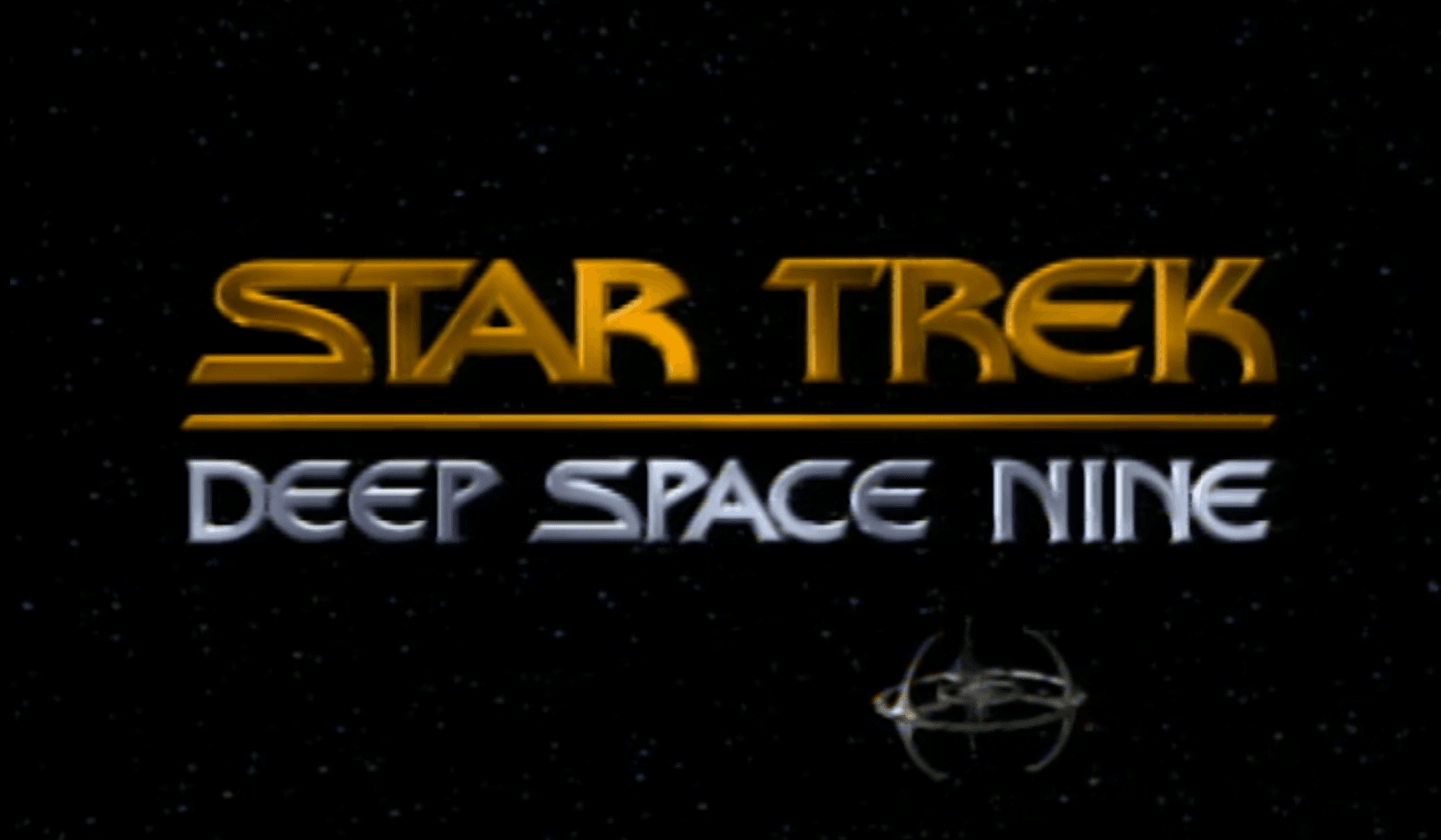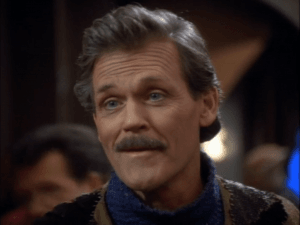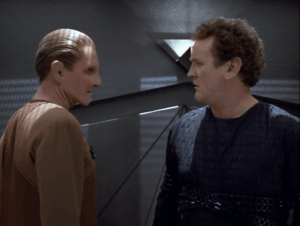
Yep, it’s another ‘Final Frontier Friday’! This week, we’re finally getting back to ‘Deep Space Nine’ with a look at the penultimate second season installment ‘Tribunal’.
Like a lot of ‘Deep Space Nine’ episodes, ‘Tribunal’ builds on what came before, taking what at the time may have seemed like a throwaway line and running with it. In fact, the episode was inspired, pretty much in its entirety, by a line spoken by Gul Dukat in ‘The Maquis, Part II’, just a few episodes prior. Discussing the fate of a group of Maquis prisoners, Dukat tells Sisko that “on Cardassia, the verdict is always known before the trial begins, and it’s always the same.” That verdict, naturally, is “guilty”. This itself was reflective of an idea the show was fleshing out around that time, namely Cardassian cultural attitudes relating to the infallibility and primacy of the state. This, in turn, was most memorably articulated in another then-recent episode, ‘The Wire’, in which Garak sings the praises ‘The Never-Ending Sacrifice’, a great work of Cardassian literature that tells the story of seven generations of a single family, each of whom leads lives of selfless devotion to the state.

But that’s not all that was going on behind the scenes. See, there was a maxim of sorts among the ‘Deep Space Nine’ writing staff: “O’Brien must suffer”. This was an outgrowth of the writing staff’s recognition of O’Brien’s everyman qualities. He really is, after all, an almost uniquely salt of the Earth figure, a decidedly working class character in the essentially classless ‘Star Trek’ future. In contrast to most of our Starfleet leads (pretty much everyone save for Captain Sisko and Dr. Crusher, actually) he’s a family man. He’s also an enlisted man rather than an officer. All of this combines with Colm Meaney’s performance to produce one of the most relatable characters the franchise has to offer. As Ira Steven Behr put it, “in a show about humans and aliens, he’s as human as you get.” Robert Hewitt Wolfe, a frequent writing partner of Behr’s, agreed, describing O’Brien as “a working class schmo just trying to get through his day.”
And so, we get the “O’Brien must suffer” episodes. Basically, because of his relatability, the writers realized very quickly that putting the character through hell resulted in episodes with a particular emotional resonance. And so we ended up getting an episode or two every season in which the writers found some new and exciting way to torture the poor guy. In an interview featured on the show’s fifth season DVD box set, Wolfe summed up the mindset behind the “O’Brien must suffer” tradition as follows: “If O’Brien went through something torturous and horrible, the audience was going to feel that, in a way they wouldn’t feel it with any of the other characters. Because all the other characters were sort of, I wouldn’t say larger than life, but nobler than life. But O’Brien was just a guy, trying to live his life and so if you tortured him that was a story.”
And boy, would they torture him. Case in point…

O’Brien is getting ready to leave Deep Space Nine for a weeklong vacation with his wife when he – quite literally – bumps into an old friend on the promenade. The man – Boone – served with O’Brien on the Rutledge, but has since left Starfleet. O’Brien is surprised to learn that Boone now lives on one of the colonies that ended up on the Cardassian side of the Demilitarized Zone, given that their service on the Rutledge coincided with the Border Wars and placed the two men in the midst of the Setlik III massacre, one of the bloodiest battles of the war. After O’Brien rushes off to meet Keiko, Boone is shown to have been recording their conversation.
Later, the O’Briens are underway in a runabout. Just as the Keiko finally coaxes Miles into putting down the tech manuals and relaxing a bit, they are approached by a Cardassian patrol ship. The Cardassians hail the runabout and their commander, Gil Evek, insists on sending an inspection team aboard. With no real alternative, O’Brien agreed and lowers the shields. Evek beams aboard and promptly arrests the chief, refusing to tell him what he’s been charged with.
On Cardassia Prime, O’Brien is processed, a process that involves him being stripped, drugged, and restrained as a pair of Cardassian guards collect a hair sample, conduct scans, and extract one of his molars. After this, he is greeted with disorienting courtesy by Makbar, the Chief Archon (judge). She informs him that his trial has been scheduled as a guard hands him a set of clothes. She tells him that his case has been assigned to Kovat, who she said is the best conservator (lawyer) in the business. She still won’t tell him what crime he supposedly committed, saying only that he’ll find out “in good time”. Back on DS9, Sisko tells Keiko that Starfleet has sent a number of ships (including the Enterprise) to the border in the hope that the Cardassians will get the hint that whatever they’re up to is jeopardizing the treaty. A hail comes is. It’s Makbar. She assures Sisko that O’Brien is alive and being treated well (“From a certain point of view…”), though she still won’t reveal the charges, stating that they will only be announced when the trial begins. When Keiko objects, she is told that the verdict is already in and that her husband has been found guilty and his execution scheduled. The trial is a formality, which will “reveal how this guilt was proven, by the most efficient criminal justice system in the quadrant”. Keiko – and only Keiko – was invited to attend the trial. Odo volunteers to serve as O’Brien’s nestor (advisor to the offender)- and is allowed to do so as he was designated an Officer of the Cardassian Court during the Occupation.

Conservator Kovat arrives to meet with O’Brien in his cell. O’Brien, well aware that he’s already been convicted and sentenced wonders why he needs a lawyer. Kovat explains that the conservator’s job is to help the accused see the wisdom of the court – essentially, to coax a confession and maybe even some contrition out of him. When O’Brien expresses his contempt for the proceedings Kovat is thrilled, remarking as he leaves that if he can keep up that arrogance, they’ll “put on a very good show indeed.”
Back on the station, they’ve been looking for anything that might explain what’s going on, and in doing so they’ve come across a weapons locker that happens to be short a couple dozen photon warheads. Kira points out that getting the warheads off the station without tripping an alarm would have required a transporter expert. Bashir bristles at the implication, but the computer records show that O’Brien’s voiceprint was used to access the locker. Kira further notes that the Maquis recently stole a shipment of photon launchers – but no warheads. But while this certainly doesn’t look good, it raises as many questions as it answers. Assuming the warheads were aboard the runabout, how did the Cardassians know? And who was “the other guy”? There had to be someone to take delivery. And so the investigation turns to the Maquis. On Cardassia, Odo visits O’Brien in his cell. He tells him that Keiko is present and that he has an idea of what the charges might be, though the Cardassians won’t confirm or deny anything. Being Odo, he doesn’t so much tell O’Brien his theory as ask a series of probing questions to test the chief’s innocence. O’Brien, of course, knew nothing of the theft. O’Brien starts to break down, and Odo adopts a more conciliatory tone, telling O’Brien that he’s been named to his defense team and that Keiko will be in the courtroom. Before he leaves, he tells O’Brien to carry himself as exactly what he is: an innocent man.
